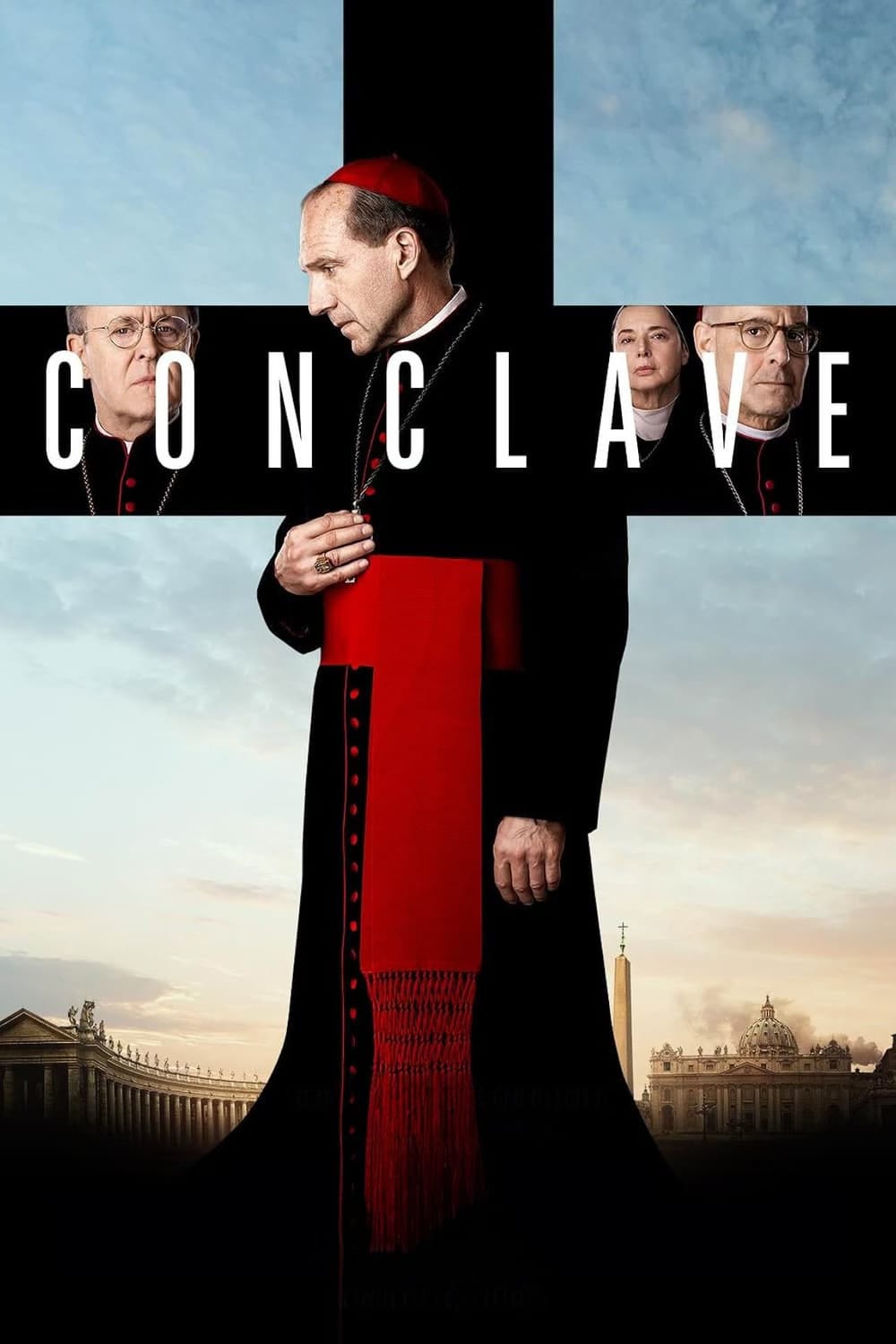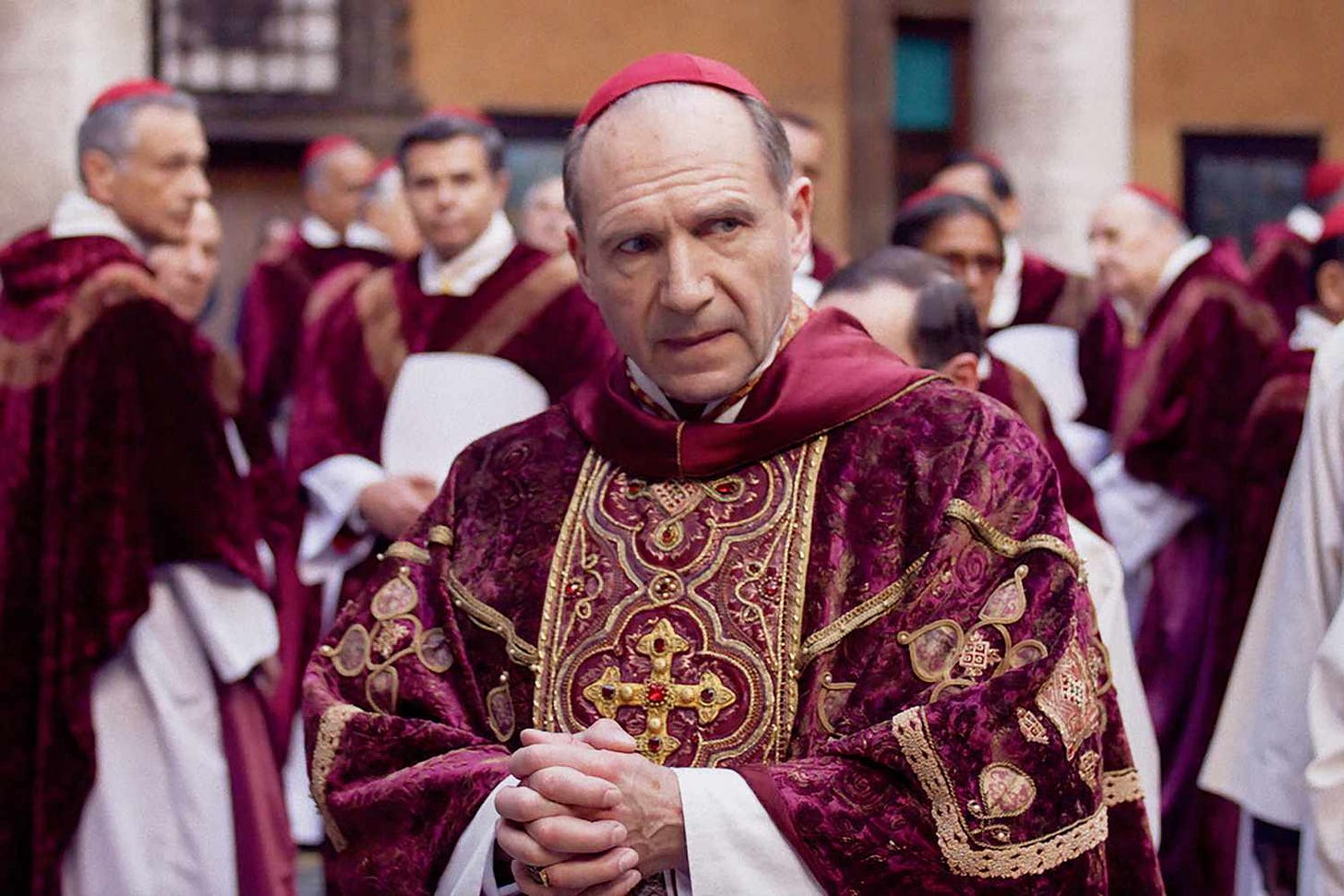Review: Conclave
My thoughts on Edward Berger's film adaptation of Robert Harris' novel depicting a conclave to elect a pope.
I don’t write too much about it in this space, but religion, particularly Catholicism, has always been an interest of mine. It’s something I’ve thought a great deal about and written about in many different spaces. I’ve spoken with/known/been friendly with many priests and other people involved in the church (and I’m lucky because of that/I know that’s not everyone’s experience), so it’s a “world” I know and understand.
It’s with all this in mind that I watched the 2024 film Conclave. Directed by Edward Berger and based on the 2016 novel by Robert Harris, Conclave stars Ralph Fiennes, Stanley Tucci, John Lithgow, Sergio Castellitto, and Isabella Rossellini.
Here’s a description of the plot from IMDB:
When Cardinal Lawrence is tasked with leading one of the world's most secretive and ancient events, selecting a new Pope, he finds himself at the center of a conspiracy that could shake the very foundation of the Catholic Church.
I read Harris’s novel upon which the film was based, so the narrative’s twists and turns were not of any great surprise to me. One thing Berger did in this adaptation is to take a novel that was pretty pulp-y (think… elevated beach read) and turn it into something much more stylish. Berger, screenwriter Peter Straughan, and cinematographer Stéphane Fontaine have taken this story and turned Conclave into something like a sleek, stylish spy thriller. I haven’t had the chance to see Berger’s 2022 adaptation of All Quiet on the Western Front, but I’m more intrigued now after seeing what he did with Conclave. There are moments when you forget you’re watching a film about priests and instead think you’re watching a James Bond or Jason Bourne film (ok, maybe that’s a bit much/think the 2011 adaptation of Tinker, Tailor, Soldier, Spy, but still).
Fiennes is receiving a great deal of award season buzz as the Dean of the College of Cardinals who runs the conclave to choose the next pope. All that praise about Fiennes is well deserved. I said in my A Complete Unknown review that I thought Chalamet has the Best Actor Oscar in a headlock/chokehold, but Fiennes complicated things for me by giving a measured performance, keeping things in check except for the right moments when he needs to be “loud,” as it were. I still think Chalamet is the favorite, but Fiennes is deserving and he might be the candidate for a “it’s time” win.
Tucci is also pitch-perfect as an American more progressive cardinal while Sergio Castellitto is a revelation to me as a more traditional, far right cardinal. Lithgow didn’t quite hit the right notes for me as a Canadian cardinal, but his presence is still welcome. Rossellini was a welcome presence as Sister Agnes while Carlos Diehz was a breakthrough and perfect in his role as a Mexican-born archbishop in Afghanistan who is an important presence at the proceedings.
While the film does have the feel of a thriller or a tale of espionage, Conclave is also a great meditation on the role of the Church in the 21st century. What the film has to say about the Church and its role in the modern world is… if not meaningful, done in good faith and with good intentions. I’ve seen some of the platitudes the film expresses be called out in reviews, and yes the film isn’t some real advanced theological meditation directed more Scorsese or Terrance Malick. But trying to understand the Church’s place in the world, that it has a place in the world, I think that’s a meaningful idea to engage with, even if it’s done in broad strokes. Just as there are these factions amongst the Church hierarchy, you see the same thing played out in the members of the church itself. Tradition, progress, conservative, liberal… Conclave depicts that there are these different pulls and groups within the big tent of the church itself.
I also enjoy how the film showed these cardinals, these highest members of the Catholic Church, as just… people. People in positions of power, yes, but as people. One of the things that bothers me about the depiction of religion in media is that it trends too far one direction or another. The religious figure as the monster, the predator, and then also yes as some kind of graven image of extreme purity. I always enjoy these texts that take the lives of priests and nuns seriously and depicts them as real. Again, granting that this is talking about figures at the highest levels of an institution (in this case, the Catholic Church), it always feels… real.
Now, I don’t think Conclave is a “great” film. Though Berger has elevated the material in some ways, in others it still remains a pulpy tale. I didn’t love the major twist/revelation in the story. I see why it is what it is and it makes sense from a thematic perspective, but it didn’t really work for me. I remember having a similar reaction when finishing reading the novel itself, so short of completely deviating from the source material there was maybe nothing to do. The filmwork itself feels very workman-like, which makes sense when you have great actors and great locations (the film was filmed in Rome and the Vatican locations were clearly painstakingly recreated on the sets. But though I enjoyed the performances (Fiennes, Tucci, Castellitto, Diehz) and enjoyed this depiction of a papal conclave and what the inside of the institution that is the Catholic Church is like, it’s not a film that goes to another level. On my Letterboxd page, I have my own rating system and here’s what I have for the three-and-a-half star film (out of five): “Very good, a lot I liked but a few things I didn’t and that keeps it from being great/four-star and above.” That’s almost exactly what I’d say about Conclave. I’d recommend it to everyone and it features some great performances, but I’m not arguing it hits that very good/great level.





